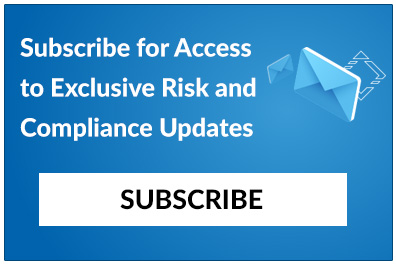Home/ Blog / The Impact of the COVID-19 Pandemic on Domains of Bank Governance, Risk, and Compliance Management
Most threats are a risk to limited sections of the economy and businesses. The Covid-19 Pandemic is unique because no other event in modern times has had such a disruptive and widespread impact on our economy. Banks are the backbone of any functioning economy which is why banks have been at the forefront of using governance, risk, and compliance strategies to contain the impact of the pandemic and ensure business continuity.
Banks are using a multifaceted approach to detect problems and deal with the risks affecting each domain by evolving the workflows of the domains. Here are some of the changes the board members of banks are pursuing within their organization:
Compliance Management
Compliance managers are ensuring compliance with the rules and regulations set up by state governments to contain the virus. The American Bankers Association has an extensive list of the banking industry’s response to the pandemic. Most states currently have a stay at home shelter; however, we can expect further regulations and laws if the pandemic continues for a longer than expected time. Regulators may create new rules about how the employees interact with customers which will need to be integrated into the compliance framework of every bank in the state.
Risk Management
Risk management optimization has quickly emerged as one of the best defenses an organization can have to ensure business continuity while the pandemic lasts. Businesses are augmenting the capabilities of their risk teams through smart investments into risk technology. Risk managers will play a vital role in helping businesses assess risks and creating strategies to mitigate those risks. Under normal circumstances being proactive is considered the best approach towards risk management; however, since the pandemic is a risk that has already been actualized, there has been a focus on approaches that can react quickly to latest developments.
Banks are using risk technology to provide faster risk assessments, risk dashboards, risk insights, and much more to help the risk management team quickly detect, assess, and mitigate risks. We can also expect some structural changes in how the risk department collaborates with other departments during the pandemic. Risk experts may be asked to work directly with the heads of different departments to minimize negative impacts.
Vendor Management
The role of vendor management is more important now than ever. Vendor management helps business ensure that the supply chains that enable their business are not disrupted and the pandemic has resulted in major disruptions in these supply chains. Banks need a way to manage vendor performance and certifications, so they have a variety of vendors for each essential item and service the bank needs to continue functioning. This includes vendors that provide the paper used in bank documents, the network and IT infrastructure vendors, security providers, and many other vendors.
A good vendor management solution will enable businesses to quickly determine which vendors are functioning at full capacity and which ones can be used as backup in cases of emergency. The qualification and certification management built into many vendor management solutions will help banks find the vendors that satisfy compliance and regulatory requirements related to vendors.
Policy and Procedure Management
There have been many announcements from the Federal Reserve about Covid-19 related policy changes. All these policy documents will need to be shared among the employees. Any documents that are affected by the changes will have to be reviewed and updated. A document or policy management strategy can help banks quickly update all the required documents and propagate the important information regarding changes to all the stakeholders within the bank. There have been discussions about pausing mortgage payments; any such changes will bring with them a major overhaul in documentation as new policies with new timelines are drawn up.
Banks have a direct view of the effects the pandemic has on the economy which is why they are augmenting their own governance to become better at resolving governance, risk, and compliance issues. Share on XRegulatory Change Management
Banks are preparing themselves for the regulatory changes that will be announced over the next few months. The government is expected to provide strong protections for banks and the economy by easing up regulations and making it easier for banks to provide necessary support to small businesses across the country.
We can expect multiple regulatory changes spaced out over the next few months until the situation becomes more stable because there have been multiple regulatory updates and relief programs announced on the FDIC website in April. The banks that can quickly adapt to the new changes will have a competitive advantage; their agility in conforming to the new normal will allow them to leapfrog the competition in offering new products and services to small businesses.
Banks have a direct view of the effects the pandemic has on the economy which is why they are augmenting their own governance to become better at resolving governance, risk, and compliance issues. If you are looking for a way to improve the way your bank deals with issues related to the pandemic, then get in touch with our risk experts to view demos of tools and technologies that can help.
Request a Demo
Complete the form below and our business team will be in touch to schedule a product demo.
By clicking ‘SUBMIT’ you agree to our Privacy Policy.



